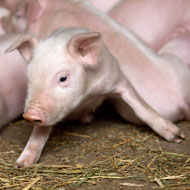
Pig specialists from the APHA have said the risk of African swine fever entering the UK is the number one concern for the industry when it comes to exotic diseases.
ASF has never occurred in the UK but has been regularly detected in wild boar across several eastern EU countries since 2014, and longer in Russia and Ukraine. An outbreak was confirmed for the first time in Romania this week, and in the Czech Republic in June.
Dr Susanna Williamson, pig veterinary lead at the APHA’s disease surveillance unit, told Pig World that an ASF outbreak would be ‘hugely damaging’ to the UK pig industry. She is urging all UK producers to take precautions, particularly when it comes to feeding pigs.
There have now been more than 60 cases in the Czech Republic, and these outbreaks represent a “significant geographic jump” further west, Dr Williamson added.
"ASF is in Eastern Europe and there is a focus of infection there in wild boar, which is spilling over into domestic pigs. In the past few weeks is there have been wild boar found dead due to African Swine Fever in the Czech Republic and that means it has moved further west."
Although the source of the infection has not yet been confirmed, she said it could be due to illegal movements or feeding on contaminated products.
“The first wild boar cases in the Czech Republic were mostly found near inhabited areas and introduction of infection by wild boar consuming contaminated products is the most likely scenario. So it is on our radar.”
Both Defra and the APHA continue to describe the UK’s risk level as ‘very low’ - meaning ‘rare but could occur’. However, Dr Williamson said this is not the same as ‘negligible’ and the classical swine fever outbreaks in 2000 and foot-and-mouth disease in 2001 serve to reinforce this.
“We continue to emphasise the role all pig farmers play in making sure their farms are as biosecure as possible,” she explained.
“The most important thing is ensuring no meat or meat products are ever fed to domestic pigs, which is illegal anyway. It is unlikely anyone would do this deliberately on a commercial farm but smallholder or pet pig owners may consider that it is acceptable to feed their kitchen waste to their pigs and need to know that they are breaking the law and endangering the health of their pigs.”



 The Veterinary Medicines Directorate (VMD) is inviting applications from veterinary students to attend a one-week extramural studies (EMS) placement in July 2026.
The Veterinary Medicines Directorate (VMD) is inviting applications from veterinary students to attend a one-week extramural studies (EMS) placement in July 2026.